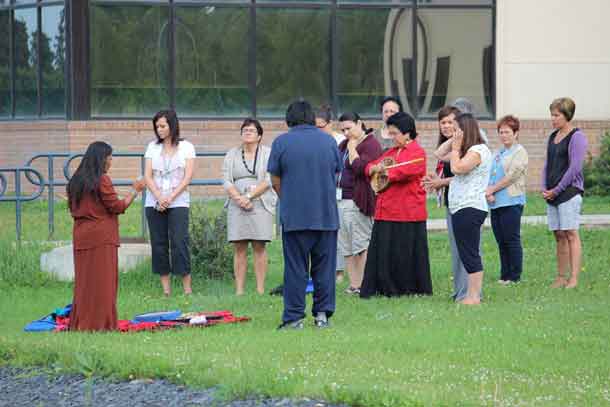Conference Board of Canada’s Research Reveals Urgent Need for Long-Term Support
Indigenous youth in foster or kin care in Canada require sustained, long-term investments in their education and mental health during their time in care to unlock better economic opportunities in adulthood, according to a recent study conducted by The Conference Board of Canada. This groundbreaking research, supported by the RBC Foundation through RBC Future Launch and in partnership with the Children’s Aid Foundation of Canada, highlights the critical importance of addressing the well-being of Indigenous youth in care for the nation’s economic future.
Calls for Indigenous-Led Solutions to Address Educational Attainment and Infrastructure Gaps
Susan Black, President and CEO at The Conference Board of Canada, emphasized the significance of prioritizing the economic prosperity of Canada and its citizens. She stressed the need for public and private funders to focus on Indigenous-led solutions that tackle issues such as educational attainment, infrastructure gaps, employment opportunities, and provincial policy barriers to ensure that children and youth can reach their full potential in adulthood.
Key Findings Unveiled:
The research has brought to light several key findings that underscore the importance of targeted investments and policy reforms:
- High School Graduates More Likely to Pursue Post-Secondary Education: Indigenous children and youth in kin care, where they are cared for by their family or home community, who successfully graduate from high school are significantly more likely to pursue post-secondary education compared to those in foster care.
- Better Mental Health in Kin Care: The study also reveals that children and youth in kin care report better mental health outcomes than their counterparts in foster care, showcasing the potential benefits of culturally rooted care arrangements.
- Need for Long-Term Funding: Public and private organizations are urged to allocate long-term funding to support Indigenous child and family well-being agencies in offering programs that extend beyond the transition to adulthood, addressing the precarious living conditions that often await these youth.
- Impact of Provincial Age Cut-offs: The current provincial age cut-offs negatively affect programs and services, including financial support for caregivers. This can lead to difficulties for youth in accessing higher education and employment opportunities, further exacerbating economic disparities.
- Lifetime Income Shortfall: On average, a First Nations person who grew up in care on reserve faces a lifetime income shortfall exceeding $1.2 million compared to a non-Indigenous person from the general population.
Economic Implications of Inaction: Billions at Stake for Canada
The research underscores the urgency of addressing education, employment, and mental health outcomes for Indigenous youth in care reaching adulthood in the next five years. Failure to do so could result in significant economic losses for Canada, ranging from $2.0 billion to $5.5 billion, as projected by different economic modelling scenarios.
Partnerships and Indigenous-Led Solutions the Way Forward
Mark Beckles, Vice President of Social Impact and Innovation at RBC, emphasized the importance of providing Indigenous youth, in both kin and foster care, with the educational tools, skills, and opportunities needed for a smooth transition into adulthood. Collaboration with organizations like The Conference Board of Canada and the Children’s Aid Foundation of Canada aims to raise awareness and provide essential resources for Indigenous youth’s brighter future.
Policy Reform and Focus on Kin Care
The Conference Board of Canada advocates for the implementation of programs and policies aimed at improving opportunities for kin care, aligning with Indigenous values such as family connection, self-determination, and the future state of Indigenous-led child welfare in Canada. Policymakers are urged to reconsider provincial guidelines to ensure that youth receive essential support during critical life transitions.
A Call to Action for Increased Resources and Policy Changes
Valerie McMurtry, President & CEO of the Children’s Aid Foundation of Canada (CAFC), emphasized the importance of Indigenous-led solutions for better outcomes in care. CAFC is committed to empowering young people to connect with their cultural identities, pursue well-being, and achieve academic goals. McMurtry views this report as a call to action for increased resources, meaningful policy changes, and thoughtful engagement with Indigenous Elders, sector leaders, and youth.
Supporting Families and Communities
Mona Buors, Minister for Métis Child & Family Services at the Manitoba Métis Federation, highlighted the importance of keeping children with family and kin, even when parents are struggling. Partnerships with private funders are seen as invaluable in creating programs that facilitate decision-making, reunification, and the well-being of children in care. Buors stressed that the entire family is part of their Nation, and they are committed to never abandoning them.
Focusing on Cultural Identity and Community
Thelma Morris, Executive Director of Tikinagan and Child and Family Services, emphasized the disparities faced by young people in care as they transition into adulthood in First Nations communities. The report underscores the urgent need for equitable support, both on and off-reserve, and emphasizes Indigenous-led programs and culture-based approaches to ensure children and youth stay connected to their family and culture.






